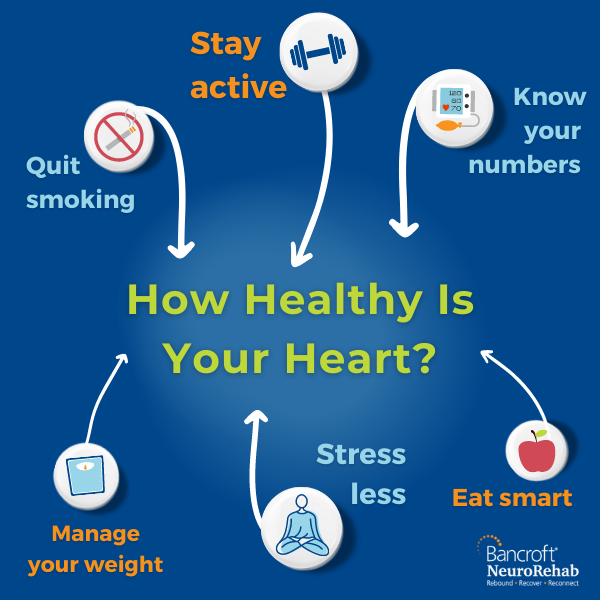Tips To Prevent Heart Disease and Stroke
Heart disease is the leading cause of death for both men and women in the United States. In addition to being leading causes of death, heart disease and stroke can result in serious illness, disability and decreased quality of life. We know heart problems can impact brain health – and that many risk factors are controllable or preventable. American Heart Month is the perfect time to take charge of your health and reevaluate just how healthy your heart – and brain – really is.
Here are 6 things you can do to prevent heart disease and stroke:
Quit smoking.
According to the CDC, smoking is the leading cause of preventable death in the U.S.
Eat smart.
If you’re trying to improve your overall diet, adopting a heart-healthy diet is a great place to start. Include plenty of fruits and vegetables and low-sodium options in your daily meals. Avoid added sugars or foods high in fat.
Manage your weight.
Being overweight or obese greatly increases one’s risk of developing heart disease, high blood pressure and type 2 diabetes. Controlling your weight is an important way to lower stroke risk. Work with your healthcare provider to determine a healthy weight and develop an action plan to achieve that goal together.
Stay active.
Aim for 30 minutes of exercise, five days a week. A brisk walk – one where your heart rate is elevated but you can still hold a conversation – is a great place to start. Consult your healthcare provider before starting a new exercise program and begin slowly, especially if you haven’t been active for a period of time. Try setting exercise goals, too, as this can keep things fun – and keep you motivated.
Know your numbers.
Work with your healthcare providers to manage conditions like high blood pressure or cholesterol, and take medication as prescribed. It’s well-known that high blood pressure can cause a heart attack or stroke, but over time, it can also affect the health of blood vessels in the brain. As those blood vessels weaken, small amounts of brain tissue can die – leading to memory problems and even a form of dementia.
Stress less.
A consistently elevated stress level has been linked to an increased risk of heart disease and stroke. Not to mention, chronic stress can negatively impact your mood, sleep schedule, and appetite.
It’s not a simple task, but reducing your stress level can greatly improve your health. A consistently elevated stress level has been linked to an increased risk of heart disease and stroke; not to mention, chronic stress can negatively impact your mood, sleep schedule, and appetite. Tips for managing stress include exercising more, leaning on your support network, and carving out time to complete activities you enjoy.
Related Articles


What is Aphasia?
Michelle Valente, M.A., CCC-SLP, Bancroft NeuroRehab Outpatient Program Director and


10 Tips for Supporting a Loved One with Aphasia
Learn practical ways to support a loved one with aphasia


Home Therapy Made Simple: Practical Tips for Stroke Recovery
Recovery doesn’t stop when formal therapy ends. In many ways,









